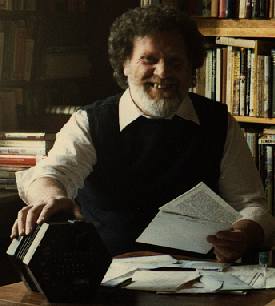> Danny Spooner > Biography
Danny Spooner Biography
 Danny Spooner (16 December 1936 – 3 March 2017) was a traditional folk
singer and social historian. Born in England, he left school at the age of 13
and worked as a salvage tug and trawler skipper before moving to Australia in
1962. He rapidly became involved in the Melbourne folk revival centred on
Frank Traynor’s folk club, and was a major figure in the Australian folk scene
ever since. He died on 3 March 2017 of brain cancer.
Danny Spooner (16 December 1936 – 3 March 2017) was a traditional folk
singer and social historian. Born in England, he left school at the age of 13
and worked as a salvage tug and trawler skipper before moving to Australia in
1962. He rapidly became involved in the Melbourne folk revival centred on
Frank Traynor’s folk club, and was a major figure in the Australian folk scene
ever since. He died on 3 March 2017 of brain cancer.
Danny Spooner doesn’t talk about history, he weaves it into a magic yarn. He has been described as a “living national treasure” by Professor Max Charlesworth. It’s a title he chuckles at but appreciates. Accolades keep rolling in for his extensive study of Australian, British and Celtic history, through the spoken and sung word. Born into a working-class family in the East End of London prior to World War 2, Danny Spooner grew up with the traditions and folklore of a typical Cockney family.
He left school at the age of 13 to become a barge boy on the sailing barges which plied the Thames and the south coast of England. Over the next 20 years he held various jobs from salvage tug, North Sea fisherman and trawler skipper—and national service. This varied, almost nomadic life, has given Danny an all-too-rare education in the ways of working class people. There was singing at work and at home, but it was not until Danny arrived in Australia in 1962, he realised that there was an audience ready, interested, and willing to appreciate the songs of his childhood and working life.
Thanks to a prodigious memory and a willingness to learn about his craft, Danny Spooner quickly developed into one of the best singers of British folksongs in Australia. Over the years he has augmented what he had learned “on the job” with a vast repertoire spanning almost every part of the British tradition as well as a respectable portion of the Australian folk heritage.
Danny has performed in folk clubs all over Australia, New Zealand and in Britain on his visits home, and has appeared at every major folk festival in Australia, at which he has given a vast range of workshops on aspects of folks songs of Britain and Australia.
Danny has worked at universities and secondary schools using his knowledge of folksong and lore to augment his teaching of history and literature. He was most recently working at Mowbray College, in Melton, Victoria.
If there is one thing that sets Danny Spooner apart from other singers, it is his generosity in helping aspiring singers to learn more about their craft. This he has done unstintingly since he began to sing in Australia, and it is many’s the singer who owes his start and a good deal of his repertoire, for folk music, to this unusually talented man.
Workshops Given at Folk Festivals
- Popular Beverages
- The Days of Queen Bess
- Soldiers of the Queen
- Songs of the fishing trade
- Songs of the mining industry
- Songs that made Australia
- True Patriots All—songs of the convict system
- Bolters, Bushrangers and them agin’ the law
- Songs of the Gold Rushes
- The Inimitable Thatcher the Goldrush Songster
- The poets and the 1890s
- The Great Depression in verse and song
- Percy Grainger: collecting in England (a copy held in the Library of Congress)
- The many faces of love
- The Erotic Muse
Topics Dealt With in Lectures/Workshops
- Songs of the sea and shanties
- Ritual and Magic
- Seasons and Ceremonies
- John Barleycorn and Jesus Christ
- The Carol
- The Traditional Ballad
- The Elizabethans
- Whaling and fishing
- Mining
- The Changing face of War
- Sailors and soldiers
- Popular beverages
- Bothy ballads
- The Agrarian and Industrial Revolutions in Britain
- Convicts
- Pastoral settlement and shearing
- The gold rushes
- Lawson and the 1890s
- The First AIF and World War 1
- Songs of the trade unions
- The Great Depression
- Working men and working women
- When a man’s in love
- Folksongs as source materials for history and literature
- Erotic folksongs of the British Isles
Acknowledgements
Most of this page was is adapted by Garry Gillard, with thanks, from the page that used to be on the Cygnet Folk Festival site. The first paragraph is taken from Wikipedia.

